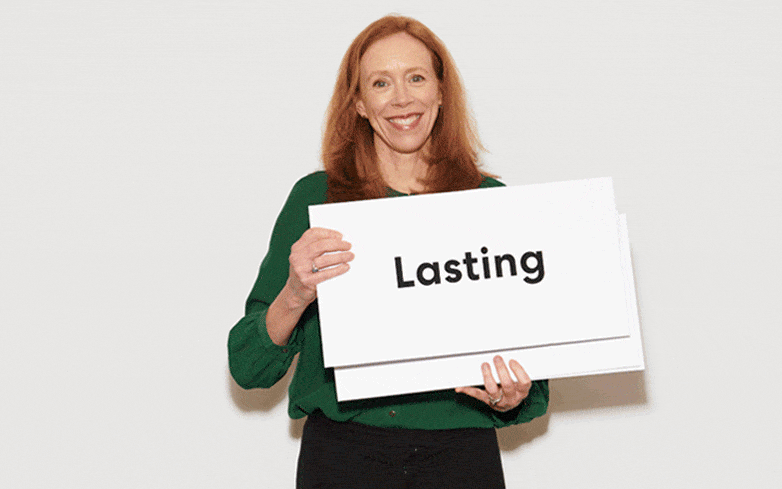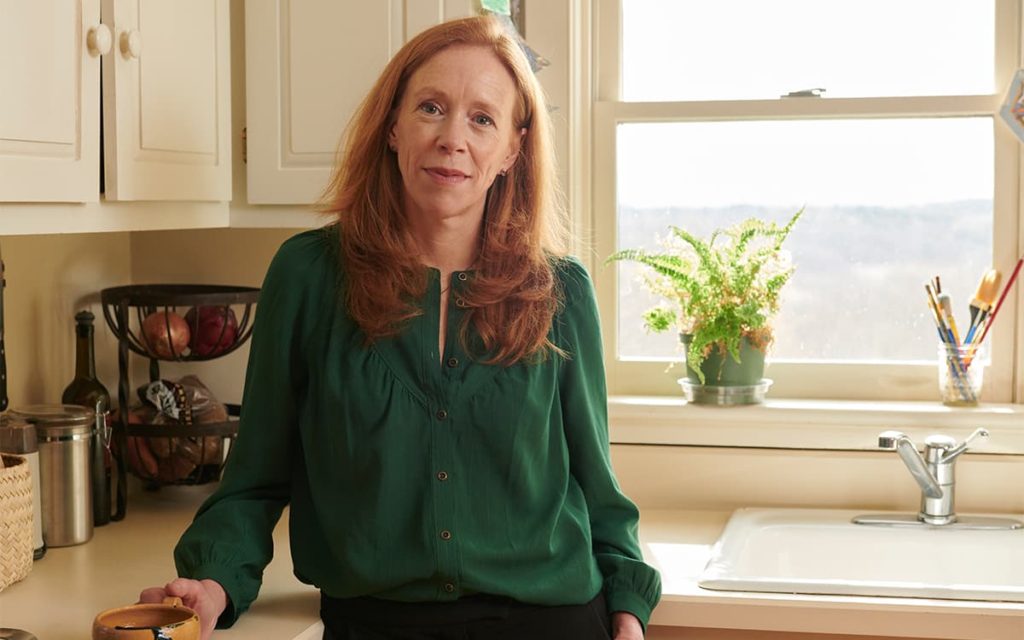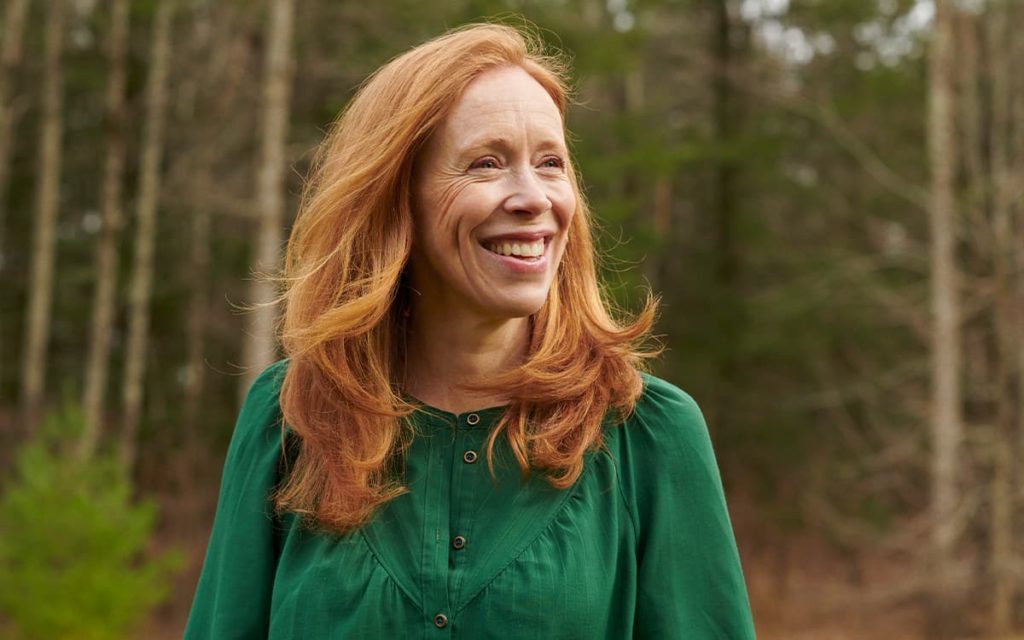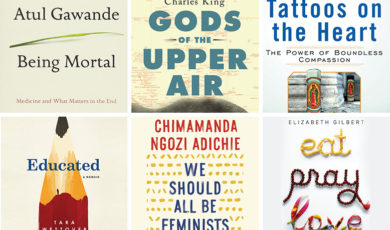Meet the Producer-Turned-CEO Making Girls’ Education a Priority Around the Globe

In April 2019, we launched The Power of Good Fund by bareMinerals, which supports women’s empowerment in the areas of education, mentorship and entrepreneurialism. In this series, we’re putting the spotlight on one female leader from each organization. Today, we’re proud to feature Christina Lowery, the CEO of Girl Rising, a nonprofit organization that uses media and storytelling to change the way girls are valued and educated around the world.
Some of Christina Lowery’s favorite stories about girls’ education have a lot to do with boys. As CEO of Girl Rising, a nonprofit organization that is working to change the way the world values girls and their education, it’s a bit unexpected. But the intensely focused producer-turned-executive and mother of three lights up when she talks about a particular group of teenage boys in India. Sitting at her kitchen counter (currently a raw plank stained by Easter egg dye) with a cup of chamomile tea, periodically reassuring Mona, her family’s large black dog, she explains animatedly how Girl Rising’s curriculum on gender equality and education was brought to schools and communities in 5 states across India. Developed with local partners, the program for middle school girls and boys teaches the benefits of gender equality and consequences of gender-based discrimination, challenging stereotypes at a critical age when children develop their own beliefs about gender.
As part of the 24-session program, the students are asked: How can you, personally, contribute to gender equality? In response, one participant, a 12-year old boy in Rajasthan, founded an End Child Marriage Club. When he and his friends heard of an upcoming arranged marriage, committing a girl their age to be married, often to a much older man, the boys would walk together to her parents’ house, knock on the door, and explain why they thought she should continue her education instead. Another boy started a club for brothers who pledged to help their sisters stay in school. To be in the club required three promises from a boy. First, he had to make sure his sister got to and from school safely, thus protecting her from trafficking and violence. Second, he had to teach his sister to ride a bicycle, which widens a girl’s world. Third, he had to take on some of his sister’s share of the housework, instead of leaving her to care for siblings, cook and clean while he did homework or went out to play. Upon signing an agreement and joining this club for brothers, each member was given a badge with a little green ribbon to wear on his shirt.
In a setting where teenage marriage is expected for girls, and children do not participate in decision-making, “the fact that the boys were even standing up to these norms and articulating this was extraordinary,” Christina explains. Across the entire group of participants in India there was double digit growth in the percentage of girls and boys who disagreed with parents supporting child marriage and only sending their sons to college. There was a 20% increase in children who would tell their parents to file a police complaint if they heard of marital violence, and children who participated in the program were much more likely to stand up to gender discrimination. The vast majority of participants also reported discussing the curriculum with their peers, the kind of ripple effect Girl Rising has created around the world with their programming, and is critical to lasting change.
Educating a girl is one of the most effective investments in the developing world, but as of 2017, 130 million girls between the ages of 6 and 17 were out of school. 14 million girls under 18 will be married this year. When a girl stays in school instead, she can earn more, is more likely to stand up for her rights, and has fewer and healthier children who are more likely to send their own children to school. Educating girls grows economies. It slows the spread of disease. The positive effects cross generations. In other words, it’s a solution.*
Girl Rising, the nonprofit, grew from Girl Rising, the film, which began as a project on ending global poverty by The Documentary Group, where Christina was a producer. The team spoke to experts around the world on HIV/AIDS, maternal and child health, agriculture, clean water. Whoever they talked to, girls’ education came up. There was a mountain of evidence, but very little attention at the time. For everyone on the project, this became the story of a lifetime.
The first film, released in 2013, was an innovative mix of statistics and stories based on 9 girls whose lives were written into narratives by women from their native countries — and acted by many of the girls themselves. “When we first made Girl Rising, it was not a right-based argument we were making, that it was the moral thing to do,” Christina explains. “I certainly believe that, that this is the human rights issue of our time, gender equality. But what we were so taken by when we first made Girl Rising is that there was a logical, evidence-based argument. It is a practical thing to do. It is a smart thing to do.”
It’s not always easy, just sending your daughter to school; parents face cultural, financial and logistical barriers. One of the stars of Girl Rising is Wadley, a buoyant little dreamer who is learning the history of her native Haiti in elementary school on January 12, 2010 when a life-changing earthquake hits. Her world destroyed, Wadley spends days collecting water for her family with a bucket. One day, Wadley sees that class has resumed in a small tent in front of the condemned school building, and the tiny girl rejoices until her mother explains to her, exhausted, that she can’t go because there is no money. “Money was still not completely clear to Wadley,” Cate Blanchett, the narrator of Wadley’s story, explains. “She knew that there was never enough of it, that some people had more of it than others, and that it determined in many cases how people looked at you, and talked to you, and treated you. It was the reason some people ate 3 meals every day, while others ate every couple of days. It was why, she was learning now, some kids went to school, and others did not.”

Christina’s own education began at an all-girls school in Columbus, OH. “I feel like I had every benefit that I could have possibly had,” she explains, with parents who were very focused on education. When it was time to enroll her own first child in kindergarten, Christina and her husband did the expected New York City tour, then decided instead on a small school they’d seen on a weekend escape to the Hudson Valley. The family split their time between the city and country, but when their second child was born and she couldn’t keep track of which house had milk or diapers, Christina quit her job at The Documentary Group. “That lasted for about 24 hours,” she remembers. “My boss called and said, ‘Can you just do the budgets for us, for this girls’ education project we’re working on? It’ll only take about an afternoon a week, I think, for a while.’ That project became Girl Rising. And it’s been the only thing I’ve worked on since.”
Before they ever shot a frame, the team began designing an awareness campaign; whatever they made had to drive resources to girls’ education programming and be of use in the places it is hardest to be a girl — including where they filmed in Cambodia, Haiti, Nepal, Egypt, Ethiopia, India, Peru, Sierra Leone and Afghanistan. The goal was not just to make a film; it was to create a useful tool to change minds, lives and policy. And now, six years on, the film has been translated into over 30 languages. It has been adapted for use around the globe and the organization has evolved into a nonprofit focused on storytelling via all types of media, the strategic dissemination of these stories, and working with local partners to build skills and confidence in girls and engage their communities — boys, parents, teachers and local leaders — to support education and equality.
Christina makes the transition from producer to founding CEO sound surprisingly effortless, crediting the nimble, talented team she has assembled to complement her own experience. “One of the things that has been different from my early work as a documentary film producer has been the notion and process of measurement and evaluation,” she says, which has required independent evaluation and a significant amount of testing. “Mindset and attitude change is not an easy thing to measure scientifically.”
As they move into the future, film is still an essential tool. Their most recent release was Brave Girl Rising, which was filmed at the Dadaab Refugee Camp in Kenya with a half-Hollywood, half-refugee crew, and stars an extraordinarily poised 17-year-old Somali girl who arrived at the camp, as an orphan, at just 7 years old. Dispatches from the set described the challenge and relief of having a specific role and job to do when surrounded by incomprehensible suffering, and the courage and resilience of the girls they met.

The Girl Rising team expands and contracts based on their projects around the world, with Christina and a small staff at the core, supported by a board of directors she describes as both ambassadors for the work and mentors. Personally, she is headquartered in the Hudson Valley now, and has an office in her small town, but it’s often easier to roll right into working from home, taking calls on her porch overlooking the mountains. Before Christina’s children come home from school each afternoon, their warm 2-story house is quiet, save the dog that trails her, nudging her face underhand, and an unusually talkative cat. When arrival time is near, Christina pauses to put on a pot of rice and gets back to work before her children arrive with a nanny in tow, a burst of energy and affection that brings to life the cubbies of sports equipment and the entire room temporarily possessed by Girl Scout cookies. Between the ages of 13 and 7, they have varying awareness of Girl Rising: her oldest son has seen the first film in its entirety; her middle child, a daughter, has seen selections; and her littlest son pesters her about when she’ll be making Boy Rising.
While Christina and her husband juggle work travel schedules — to Manhattan weekly, and often abroad — the kids run freely around the mud of the spring yard, surrounded by trees and a pond where they swim or skate year-round. Despite their best fox-defending efforts, the family recently lost their last chicken, and Christina’s daughter has dreamed up a plan to make the cleaned out coop a playhouse. “Look how much care and attention we, and everybody that I know with kids, spends on trying to make sure that their little spirits are just perfectly intact, and don’t get trampled upon, and that they have all the opportunities that we can possibly provide for them,” she says, sitting on her large, squishy couch, eyebrows and hands moving as she talks. She is keenly aware of the education she received and feels the responsibility of being born into the family she had, of being able to earn, create and grow into her dream job. “And I think: What if I were a mom somewhere else in the world? What if I had a daughter who was 11, and that what was normal around us is that she would be married off? What if I wanted to hold out a different future for her,” she asks, “But I literally had no power to do it?”
Learn more about Girl Rising and The Power of Good Fund by bareMinerals.
*Source: Girl Rising





